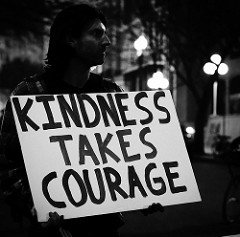
The new economy is based on human character, not on commodity trading. We see morality in everything, and our judgments are immediately proclaimed on social media. How do we lead, and grow the next generation of leaders in the human economy?
The Cecil Phenomenon
Walter Palmer, a dentist from Minnesota, became infamous in 2015 when he killed Cecil the lion. Cecil was the best-known animal in Zimbabwe’s Hwange National Park, and his pride was studied by the University of Oxford. A local wildlife guide calculated that Cecil generated revenue of $9,800/day from tourists paying for nearby lodging and photos with Cecil.
Dr. Palmer reportedly paid $50,000 for permits and to engage a local hunting guide. He apparently shot and killed Cecil in a legal hunting area.
But this story isn’t about the money. It’s about the outrage that followed Cecil’s death. Celebrities publicly condemned Cecil’s death. Jimmy Kimmell raised $150.000 in less than 24 hours to support Oxford’s research unit. The United Nations General Assembly adopted a non-binding resolution to strengthen efforts to address illicit wildlife poaching and trafficking. The US Fish and Wildlife Service added two species of lions to the endangered species list, which make it more difficult for American hunters to kill these lions. Meanwhile, Dr. Palmer’s private information was widely shared online, which resulted in “Lion Killer” being spray painted on the garage door at his Florida vacation home and protests at his Minnesota dental practice.
Keep in mind that Dr. Palmer didn’t do anything illegal.
Movements and Global Brands
Imagine you’re the CEO of a national airline. You go to sleep dreaming about fuel futures, and wake up to a petition signed by 200,000 people demanding that you ban the transport of exotic animal hunting trophies. Later that day, another significant group of people band together to challenge you for not supporting legal hunting.
In the end, Delta, American, and United Airlines all agreed to voluntarily ban the transport of hunting trophies.
We’re constantly trying to figure out how to live together in the same space, physically and digitally, with people of different backgrounds. We can look deeply into companies and even into the mindsets of the people who run them. Consider what happened with Uber, where people rose up to challenge the ethics of the company founders.
Unfortunately, as we look deeper into corporations and their leadership, we increasingly don’t like what we see. Gallup reports that worldwide, only 15% of employees are fully engaged. Only 22% of people are loyal to brands, while only 19% trust government. People would rather work for a machine or a robot because they can’t trust their boss, and think a computer would be more trustworthy.
The Human Economy
We’ve evolved from an industrial to a knowledge-based, and now a human economy. In the industrial economy, we focused on efficiency, productivity, and quality. In the human economy, we need a higher level of behavior, and that comes with character. Character can’t be bought, and it’s difficult for adults to relearn. Have you ever tried to coach someone into having more grit?
The human economy demands what character brings to the table. It’s about bringing judgment, life experiences, and skills to navigate complex situations to work. In the human economy, managers don’t figure everything out for employees; instead, employees are expected to bring complex reasoning skills to the table.
Inspired Leadership Elevates Behavior
We’ve seen situations where a company’s culture and trust is mired in a public scandal. Volkswagon had an emissions scandal, and Wells Fargo created fake accounts. We need inspired and trustworthy leadership to elevate behavior. Companies and governments struggle to create principles, missions, and value statements that allow everyone to be trustworthy decision makers. Those that figure it out and disrupt the status quo are ahead.
Consider the recent school shooting in Parkland, Florida. Everyone may not agree on gun control, but everyone can agree that schools should be safe places. Politicians offered their thoughts and prayers but literally ignored the smoking gun. But for the first time ever, students rose up to demand gun legislation. Teenagers are filling a void in a position that politicians are reluctant to make.
Even younger kids are changing the way we look at leadership. Consider Martha Payne. At 9, she created a blog that posted pictures and critiques of her school lunch. The school administrators confiscated her camera. The local news caught wind of this, and so did Jamie Oliver. Martha realized she had an opportunity to use her blog as a platform, and immediately asked for donations to Mary’s Meals to fight childhood hunger. Her original goal was to raise £7,000 to build a kitchen in Malawi, but her 10 million supporters helped her raise over £130,000. And she got her camera back from the school. On her website, she says she’s a future workplace leader. She already has a lot of substance on her resume: a book, a filming with Jamie Oliver, and a Pride of Britain Award.
Recruit Next Generation Leaders
Leaders are self-made out of their characters and elevated behavior. Leaders let people take risks and fail forward. Leaders aren’t afraid to hire other people with strong character. Leaders are also honest, and don’t shy away from taking a strong ethical stance.
Leaders also hire other leaders like Martha Payne, Cameron Kasky, Sophie Whitney, Emma Gonzalez, Brendan Duff, Dylan Redshaw and other fearless and compassionate human beings.